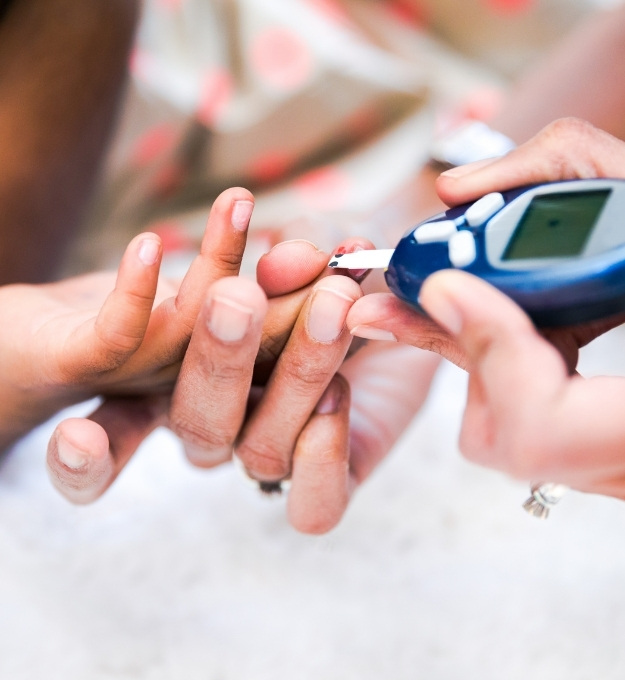Diabetes Management
Mt Ommaney
Living with a chronic condition like type 2 diabetes affects many aspects of your life and health. Managing it well entails making careful decisions on a daily basis and keeping on top of a number of regular check ups.
Now, you can see a number of different health professionals for that.
If you want greater consistency and convenience though, you should consider working with your GP to manage your diabetes.

What is a diabetes management plan?
A diabetes management plan is an annual cycle of care that addresses many aspects of your health.
When your blood glucose levels are consistently too high, you run the risk of developing diabetes complications that affect your eyes, nerves, heart and kidneys, to name just a few.
You probably won’t see those changes happening unless you deliberately look. Nor will you necessarily notice that you’re gaining weight or are less active than you used to be. When these matters are raised as part of your diabetes management program, you get the chance to reflect on your lifestyle and consider what changes you could make to improve your diabetes.
A diabetes management plan is a comprehensive approach to your care that follows Australia’s best practice diabetes guidelines.
Book an appointment to discuss your diabetes management plan.
Your GP’s role in diabetes management
Diabetes management often involves a team of healthcare professionals, each contributing their different skills.
Your GP plays a pivotal role in assessing your diabetes, helping you manage it, coordinating your care, and being a consistent presence for you through changing life seasons and health needs.
So, what should a good diabetes management plan cover? And which bits can your GP do?
| What needs doing? | How often? | Ideal result | Can your GP do it? | Who else can do it? |
| Review your diet | Every year | A healthy, nutritious diet featuring food low on the glycaemic index | Yes | Dietitian, diabetes educator, practice nurse |
| Exercise | Every year | Regular physical activity to keep you in good shape and improve your insulin sensitivity | Yes | Dietitian, diabetes educator, practice nurse |
| Smoking status | Every year | Not smoking or receiving support to quit | Yes | Dietitian, diabetes educator, practice nurse |
| Weight | Every 6 months | Within the healthy BMI range of 20-24.9 | Yes | Endocrinologist, diabetes educator or practice nurse |
| Blood pressure | Every 6 months | Equal to or less than 130/80mmHg | Yes | Endocrinologist, diabetes educator or practice nurse |
| Cholesterol | Every 6-12 months | Total cholesterol less than 4 mmol/L LDL less than 2 mmol/L HDL is 1 mmol/L or above | Yes | Endocrinologist |
| Triglycerides (blood fats) | Every 6-12 months | Less than 2 mmol/L | Yes | Endocrinologist |
| Microalbuminuria (kidney check) | Every 6-12 months | Within target range | Yes | Endocrinologist |
| Kidney function | Every 6-12 months | Within target range | Yes | Endocrinologist |
| HbA1c (overall blood glucose level) | Less than 7% | Every 6-12 months | Yes | Endocrinologist |
| Medication review | Annually or in response to test results | Yes | Endocrinologist | |
| Diabetes care plan review | Annually | Yes | Endocrinologist or diabetes educator | |
| Foot health (to prevent or treat diabetic neuropathy) | No neuropathy or, if present, early intervention | 3-6 monthly if high risk, annually if low risk | No | Podiatrist or practice nurse |
| Eye exam (for signs of diabetic retinopathy) | No retinopathy or, if detected, early intervention | At least every 2 years | No | Optometrist or ophthalmologist (eye doctor) |

Diabetes management Mt Ommaney & Jindalee
As you can see, your GP is able to manage most aspects of your type 2 diabetes care plan, ordering blood tests, providing lifestyle advice, reviewing your medications and referring you to other professionals if necessary.
Beyond that, though, your GP is also the person you see for your other health needs. Your GP tends to have a good understanding of your overall health, any difficulties you’re facing and how issues like stress or anxiety may be affecting you and your diabetes.
GPs also understand the health system. We can refer you to different specialists if you need it and prepare care plans that enable you to access more government funding towards the cost of your diabetes treatment.
Plus, your GP tends to be close by, part of the same community that you live or work in. That makes it very convenient to get your diabetes care from your GP.
If you’d like our capable GPs to help you with your diabetes, then please book an appointment today.
Disclaimer
All information is general in nature. Patients should consider their own personal circumstances and seek a second opinion.

